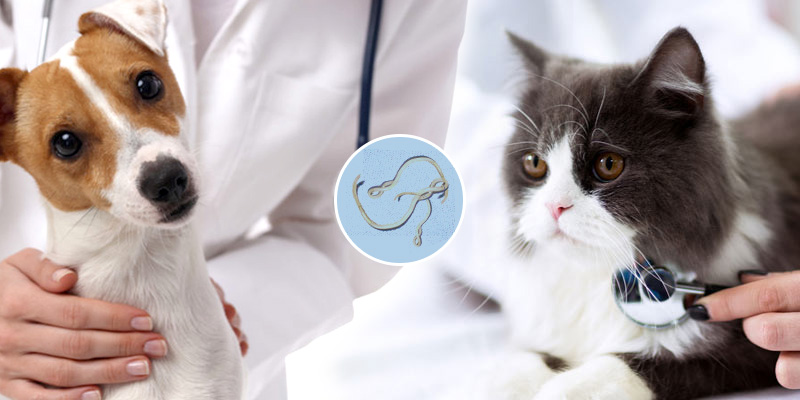Lungworms in Dogs : Symptoms & Treatment

Worms…Worms and Worms… These devils will never go away from a pet parent’s life. Lungworms are one type of parasites amongst these devils that are creating more nuisance than any other infections or infestations nowadays. You, as a pet parent, have to be more vigilant and informed about lungworms.
Lungworms settle in the lungs and the windpipe of your pet and cause several respiratory problems. This type of parasitic infection infests your pet when they are roaming in the woods and/or on fields and having fun. Lungworms are common in both dogs and cats. So, be very careful while sending your pet in open.
Let’s go through the types, symptoms of lungworms, causes, diagnosis and treatments of lungworms.
Types Of Lungworms
There are many species of lungworms which drift towards the lungs causing coughing and shortness of breath. Oslerus Osleri is the most common type of lungworm in dogs and
Aelurostrongylus abstrusus species is usually found in cats and is often called Feline lungworm.
Eucoleus aerophilus also known as Capillaria aerophila is found both in cats and dogs. Previously lungworms were very rare but now the cases of lungworms are multiplying day by day.
Lung worms Symptoms
Adult Lungworms lay eggs in the windpipe which results in the reaction in the airways. The reaction leads to breathing problems and if it becomes severe it can develop health issues like shortness of breath (dyspnea), emphysema, bronchitis, fluid build-up in the lungs and critical complications can lead to pneumonia. Symptoms are not noticeable initially but increased numbers of larvae can show some symptoms. Dogs and cats previously infected with lungworms have a degree of immunity and may overcome small re-infections.
Lungworm Causes
Your pet can get infected by lungworms when they drink water or eat prey infested with lungworm larvae. These larvae then travel in the blood-stream from the intestine and reach lungs. Once the immature parasites reach lungs they develop into adult lungworms and lay eggs in the Trachea. Eggs are then coughed up by your dog or feline or passed out in feces. Lungworms can also be passed on to pups when their mothers lick them or when they come in contact with their mother’s feces or ingest it.
Diagnosis of Lungworms
Lungworms infestations can be diagnosed by performing these tests.
• Fecal examination for eggs
• Chest X-rays
• Physical examination (lung auscultation) and history
• Complete blood count (CBC)
• Examination of fluid from lungs (tracheal wash)
Lungworm Treatment
If you come to know that your beloved cat or dog is suffering from lungworms don’t panic because there are several anti-parasitic treatments which can help you eradicate them.
• Praziquantel
• Fenbendazole
• Levamisole
• Albendazole
• Oxfendazole
• Ivermectin
• Moxidectin
These anthelmintics are very effective against lungworms. There are products with good efficacy in the market like Panacur Granules containing Fenbendazole as an active ingredient. They provide an all-round treatment for all sorts of worm infestations. However, it is always advised to consult your vet before proceeding with any treatment.
As much as treatment, prevention is also important because once these worms get comfortable in your little one’s body, they can create a huge ruckus in their healthy life. Therefore, it is always sensible to prevent lungworms beforehand because as a pet parent you will never want to see even a single health issue in your pet’s life. And, we know that.

David joined CanadaVetCare in 2013 as a product analyst and veterinary assistant. Being a passionate pet lover and keen animal health researcher, David had always found ways and solutions to help pet parents to improve their pets’ health. He is always happy to answer pet health-related queries and recommending pet parents for the right pet product for their furry companions.

